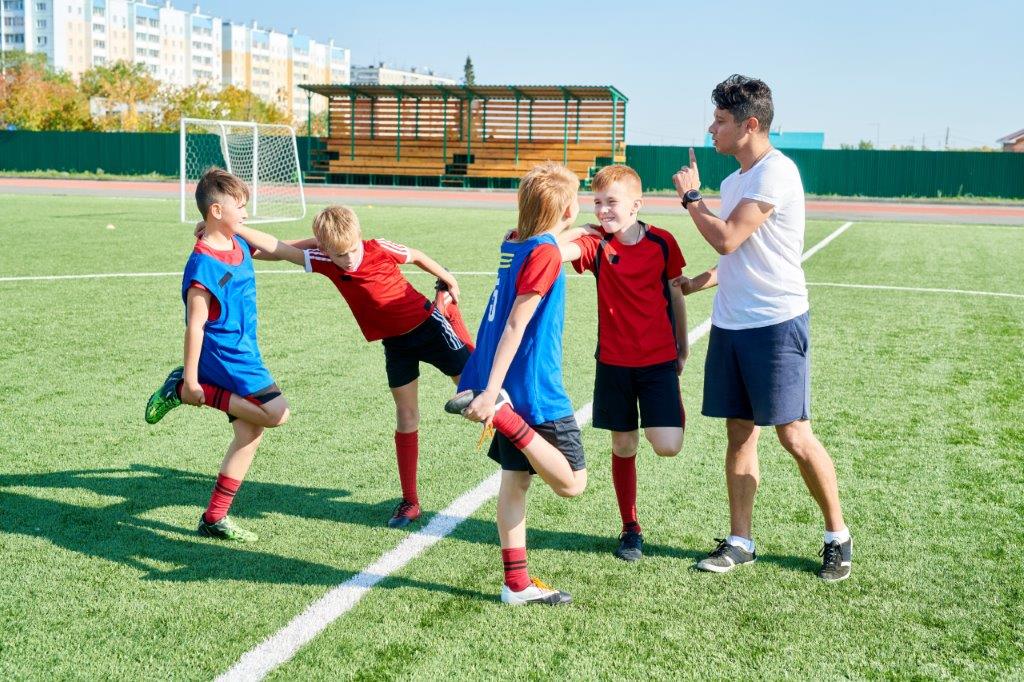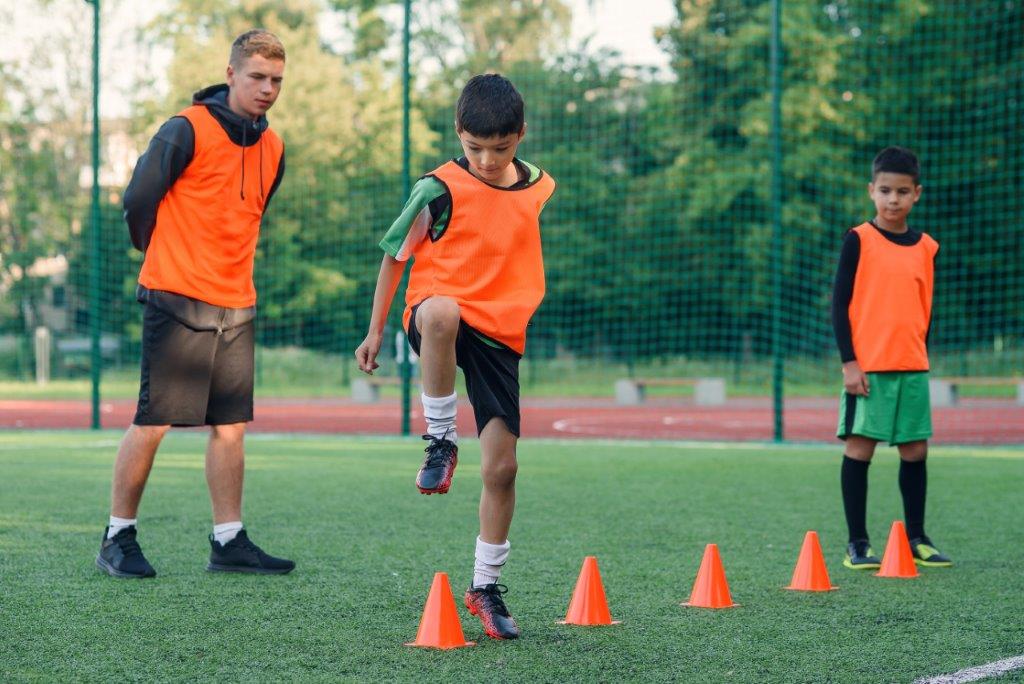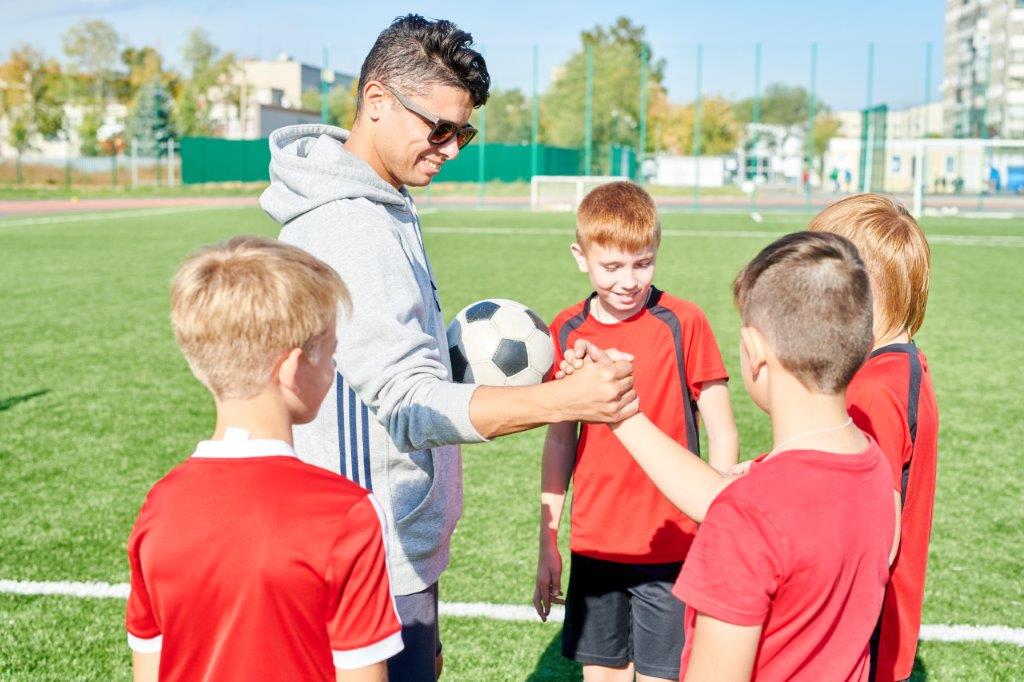How To Coach In Youth Football? – A Complete Handbook
There is no doubt that coaching youth football is a difficult task. After all, children are not the easiest people to reach out to. However, it can be one of the most rewarding jobs available. On the youth level, all of the values that guide a player and make him successful on a professional level are taught by dedicated coaches. We will walk you through every aspect of coaching youth football!
On this level, knowing what matters and what does not is critical. Everything that applies to professional coaching may not apply to youth coaching. Let us look at the fundamentals of coaching youth football.
Coaching in Professional vs Youth Football
On a professional level, players have been at it for several years, are battle-hardened, and know their game better than anyone else. Children and teenagers, on the other hand, are still developing and discovering themselves. There is also the issue of discipline, as most players do not intend to become professionals.
Furthermore, professional-level players are on a similar level, and any training routine can be planned without separating any of the players.

On the youth level, you must be aware of the limitations of a specific age group, as they cannot do everything that a professional can. Modifying training sessions based on their abilities and capacities is therefore an essential part of coaching in youth football.
After all, professional footballers have established habits, patterns, and ways of playing. Younger age groups, on the other hand, are much more adaptable, and a creative training protocol can improve and modify the skill set of any young footballer.
So let’s delve deep into youth football coaching.
How to Coach Youth Football?
To begin, any training session, regardless of level, must begin with a good warm-up that includes dynamic stretching to increase heart rate and prepare the body for the training routine at hand.
Stretching before training helps to prevent injuries and improves players’ flexibility on the field.
Orientation
Effective communication is critical at the youth level. So, before beginning any training session, it is critical to establish rapport. This is accomplished through an orientation in which you explain the objectives and demonstrate what you hope to accomplish during the training session. A demonstration of any skill you wish to teach is also appreciated and keeps the children engaged in the session.
It also increases your credibility in their eyes. Nobody likes people who do not put their words into action. Making the orientation interactive also helps, and asking children for their feedback on the training is an effective way to keep them engaged. When it comes to keeping them engaged, avoid giving a long pep talk. Keep it brief and to the point.
As you educate, emphasize sportsmanship, provide positive reinforcement, and motivate. More on all of that later!
Keeping it Interesting
As previously stated, children and teenagers are easily bored. With all of the other responsibilities that a youth football coach has, keeping things interesting is essential. So any method you can think of to keep things interesting is advised. A customized training session based on player feedback? So why not?
A corner routine you saw on the Internet that you think would be a fun little activity? So why not? Change training protocols on a regular basis to keep players from becoming too comfortable. For example, if you’ve been supervising 10-a-side games, switch to 5-a-side games. This becomes a new challenge for the young guns, stimulating their growth as footballers.
The best coaches are problem solvers and problem solvers. So keep an eye out for any opportunity to spice things up.
Do not be too Harsh
Once upon a time, complimenting a player was considered a sin. Coaches used to be extremely harsh, and it was nearly impossible to earn their praise. However, that practice should be abandoned, especially when dealing with the younger generation. A positive remark means everything to children, while a negative remark can leave a permanent mark.
Children are especially sensitive in this regard, and harsh love may be detrimental to their development. Children, like adults, are individuals with their own self-esteem. A single careless statement can be detrimental not only to the player’s development but also to their confidence off the field.
Of course, you’d have to be tough at times. It is best to use the so-called sandwich method for this. This means that whenever the need for criticism arises, you surround it with compliments. So the improvement suggestion is sandwiched between two compliments.
Another method is to drop subtle hints about the areas in which you need to improve. This helps them recognize areas in which they can improve. And the fact is that children always want to impress their mentors, and if given the opportunity, they will do everything in their power to win you over.

Practice Positive Reinforcement
On the contrary, using positive reinforcement can be extremely beneficial in the development of a young player. When you find a behavior that is consistent with what you want as a coach, informing players of your approval is a good practice.
When complimenting a good move or a good piece of defending, try to be specific so that others understand what they need to do to get that applause. A system for rewarding top performers is also a reasonable way to motivate players.
Different organizations use this method to motivate their employees, and as a youth football coach, you can do the same.
Entertain Feedback
You may believe you know what is best for your players, but entertaining feedback is extremely beneficial. It keeps players engaged and assures them that their input is valued.
Keep no rehearsed responses to any questions, and do your best to avoid biases. It also encourages critical thinking about the game because some players may end up becoming managers or other people involved in the game behind the scenes.
Teach Sportsman Spirit
Youth football is the appropriate level for children to learn about sportsmanship principles. This important lesson has many facets, but in general, any form of malicious play should be discouraged.
Helping an injured player up, kicking the ball out of play when someone is injured, or exchanging handshakes before and after a game are all examples of sportsmanship. So, whenever you see a player performing these duties during practice, recognizing them helps others understand what is expected of them.
To instill these values in your players, you must first embody them in your own demeanor as a coach. You would have to be fair and respectful to everyone. Incorporating these unspoken football rules into your training routines is an important step in your coaching and helps everyone play the game fairly.

Always Supervise
This is very important. Football is a contact sport, so fights and tackles are unavoidable. On the youth level, however, you are not dealing with adults; rather, you are the adult in charge of the entire situation. So, if an incident or a confrontation occurs, you must be present to take control and assist others. Checking for the state of the pitch and any potential stones is also an important part of a coach’s job.
If you are unavailable, you could delegate your duties to someone else. However, children should never be left alone during training. At this point, involving parents is also a reasonable thing to do if the football does not remain on the practice field.
Communicate with the parents and explain what they must do to keep their children safe while playing football. Static stretching at the end of the training routine is extremely beneficial in preventing injuries and ensuring peak performance.
Bottom Line
Youth football coaching is not as simple as one might think. However, keeping a few things in mind can make the entire process go more smoothly. A thorough orientation sets the tone for the session, and practicing positive reinforcement and leaving negative psychology behind is also essential.
It is also your responsibility to keep training sessions interesting and inventive, to teach players the fundamentals of sportsmanship, and to use their feedback to tailor the sessions to their specific needs. Finally, supervising every session at this level to ensure the safety of the players is critical and should never be overlooked.
When you coach youth prospects in this manner, they are bound to make you proud and remember your contribution to their career when the time comes.








